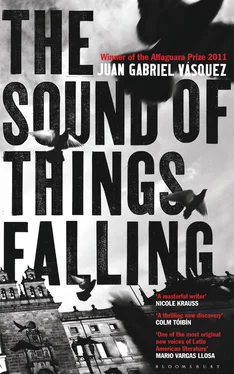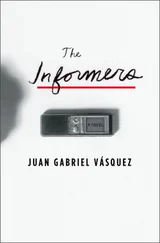I waited quite a while before leaving the house in La Candelaria, not just to listen to the recording again (which I did, not once, but twice more), but also because seeing Consu again had suddenly become urgent for me. What else did she know about Ricardo Laverde? Perhaps it had been in order not to find herself obliged to make revelations, not to be suddenly at the mercy of my interrogations, that she had left me alone in her house with her most precious possession. It was starting to get dark. I looked outside: the streetlights were already on, the white walls of the houses were changing colour. It was cold. I looked down the street to the corner, then to the other one. Consu was not around, I couldn’t see her anywhere, so I went back into the kitchen and inside a bigger bag I found a small paper bag the size of a half-bottle of aguardiente . My pen didn’t write very well on its surface, but I would have to make do.
Dear Consu,
I waited for almost an hour. Thank you for letting me hear the recording. I wanted to tell you in person, but it just wasn’t possible.
Beneath these scribbled lines I wrote my complete name, that surname that’s so unusual in Colombia and that still provokes a certain timidity when I write it depending on the people, for there are many who distrust a person in my country if it’s necessary to spell out their surname. Then I smoothed out the bag with my hands and left it on top of the tape recorder, with one of its corners trapped by the cassette door. And I went out into the city with a mixture of sensations in my chest and a single certainty: I didn’t want to go home; I wanted to keep to myself what had just happened to me, the secret and its revelation that I’d just witnessed. I thought that I was never going to be as close to Ricardo Laverde’s life as I had been there, in his house, during the minutes the black box recording had lasted, and I didn’t want that curious exaltation to dissipate, so I went down 7th Avenue and began to walk around downtown Bogotá, passing through Bolivár Plaza and continuing north, mingling with the people on the always packed pavement and letting myself be pushed by those in the most hurry and bumping into those coming towards me, and looking for less busy smaller streets and even going into the craft market on 10th Street, I think it’s 10th, and during all that time thinking that I didn’t want to go home, that Aura and Leticia were part of a different world from the world inhabited by the memory of Ricardo Laverde and of course different from the world in which Flight 965 had crashed. No, I couldn’t go home yet. That’s what I was thinking as I arrived at 22nd Street, how to delay my arrival home in order to keep living in the black box, with the black box, and then my body made the decision for me and I ended up going into a porn cinema where a naked woman with long, very fair hair in the middle of a fully equipped kitchen lifted up her leg until the heel of her shoe got caught in the burners on top of the stove, and maintained this delicate balancing act while a fully dressed man penetrated her and gave her incomprehensible orders at the same time, the movements of his mouth never corresponding to the words his mouth was pronouncing.
The Thursday before Easter in 1999, nine months after my encounter with Ricardo Laverde’s landlady and eight before the end of the millennium, I arrived at my apartment and found a woman’s voice and a phone number on the answering machine. ‘This is a message for Antonio Yammara,’ said the voice, a young but melancholy voice, a voice that was both tired and sensual, the voice of one of those women who has had to grow up prematurely. ‘Señora Consuelo Sandoval gave me your name. I looked up your number. I hope I’m not bothering you, but you’re in the phone book. Please call me. I need to speak with you.’ I dialled the number immediately. ‘I was waiting for your call,’ said the woman.
‘With whom am I speaking?’ I asked.
‘I’m sorry to trouble you,’ the woman said. ‘My name is Maya Fritts. I’m not sure if my surname means anything to you. Well, it’s not my original surname, it’s my mother’s, my real one is Laverde.’ And since I remained silent, the woman added what was by then unnecessary: ‘I’m the daughter of Ricardo Laverde. I need to ask you some things.’ I think I said something then, but it’s possible I simply repeated the name, the two names, her name and that of her father. Maya Fritts, Ricardo Laverde’s daughter, kept talking. ‘But listen, I live far away and I can’t go to Bogotá. It’s a long story. So the favour is a double favour, because I want to invite you to spend the day here, at my house, with me. I want you to come and talk to me about my father, to tell me everything you know. It’s a big favour, I know, but it’s warm here and the food’s good, I promise you won’t regret coming. So, it’s up to you, Señor Yammara. If you have a pencil and paper, I’ll tell you right now how to get here.’
3. The Gaze of Absent Ones
At seven the next morning I found myself driving down 80th Street, having had nothing but a black coffee for breakfast, heading for the city’s western exit routes. It was an overcast and cold morning, and the traffic at that hour was already dense and even aggressive; but it didn’t take me too long to get to the outskirts of the city, where the urban landscapes change and the lungs perceive a sudden absence of contamination. The exit had changed over the years, wide, recently paved roads flaunting the brilliant white of their signposts, zebra crossings and intermittent lines on the tarmac. I don’t know how many times I made similar trips as a child, how many times I went up the mountains that surround the city to then make that precipitous descent, and thus pass in a matter of three hours from our cold and rainy 2,600 metres down into the Magdalena Valley, where the temperatures can approach 40 degrees Celsius in some ill-fated spots. That was the case in La Dorada, the city that marks the halfway point between Bogotá and Medellín and that often serves as a stop or meeting point for those who make that trip, or occasionally even as a place for a swim. On the outskirts of La Dorada, somewhere that sounded quite separate from the city, from the hustle and bustle of its roads and heavy traffic, lived Maya Fritts. But now, instead of thinking of her and the strange circumstances that had brought us together, I spent the four hours of the trip thinking of Aura or, more specifically, about what had happened with Aura the previous night.
After taking down Maya Fritts’s directions and ending up with a badly drawn map on the back of a piece of paper (on the other side were notes for one of my upcoming classes: we would discuss what right Antigone had to break the law in order to bury her brother), I had gone through the evening routine with Aura in the most peaceable way possible, the two of us making dinner while Leticia watched a movie, telling each other about our respective days, laughing, touching as we crossed paths in the narrow kitchen. Peter Pan , Leticia was very fond of that movie, and also The Jungle Book , and Aura had bought her two or three videos of The Muppets , less for our little girl’s pleasure than to satisfy her own private nostalgia, her affection for Count von Count, her glib contempt for Miss Piggy. But no, it wasn’t the Muppets that we could hear that evening from the television in our room, but one of those films. Peter Pan , yes: it was Peter Pan that was playing — ‘All of this has happened before, and it will all happen again,’ said the anonymous narrator — when Aura, wrapped in a red apron with an anachronistic image of Santa Claus, said without looking me in the eye, ‘I bought something. Remind me to show you later.’
Читать дальше












